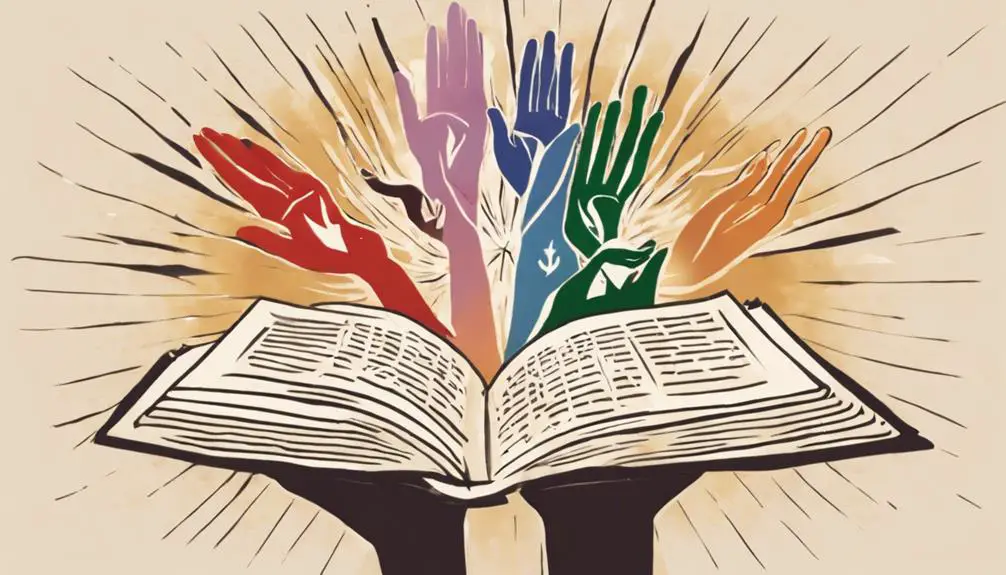Journey into the depths of the 5th Commandment to uncover its enduring influence on society and personal morality—discover why it's more than ancient words.

The 5th Commandment in the Bible
Navigating the waters of the 5th Commandment, you'll find its currents run deep through both history and modern-day relevance. You've likely heard 'Honor your father and your mother' time and again, but have you ever paused to consider its multifaceted implications?
Beyond a simple directive, this commandment bridges the gap between ancient texts and today's societal norms. As you explore its interpretations across different faiths and its undeniable impact on society, you'll uncover layers that may challenge your previous perceptions.
This journey promises to offer insights into not only historical context but also provoke personal reflections that resonate with contemporary life. Why does this ancient directive remain so compelling in our modern world?
Key Takeaways
- The 5th Commandment underscores the importance of respecting and caring for parents across various cultures and religions.
- It bridges divine mandates with societal laws, emphasizing stability and intergenerational values.
- Interpretations and applications of the commandment evolve with changing family structures and societal values.
- Respect for elders, as advocated by the commandment, shapes societal norms and has legal implications for elder care.
Historical Context

Understanding the historical context of the 5th Commandment requires delving into the ancient societal structures and religious norms that shaped its conception and application. You're looking at a period where cultural influences weren't just elements of daily life but were the very fabric that held societies together. These influences, deeply woven into the religious practices of the time, dictated the moral and ethical standards, thereby setting the stage for the commandments to emerge not merely as religious directives but as foundational legal and societal norms.
The legal implications of the 5th Commandment, in particular, reveal its significance beyond a mere familial or moral directive. It wasn't just about honoring one's parents; it was a commandment that underscored the stability and order of the community. In a time when family units were integral to societal structure, adherence to this commandment was crucial for maintaining societal cohesion and ensuring the transmission of cultural and religious values across generations.
Thus, your reflection on this commandment's historical backdrop illuminates its role as a bridge between divine command and societal law, a testament to the profound interplay between cultural influences and legal implications in shaping human conduct.
Modern-Day Relevance
Reflecting on the ancient origins of the 5th Commandment, it's crucial to explore its enduring significance in today's societal and familial structures. At its core, this commandment emphasizes respect and care for one's parents, a principle that transcends time. However, the application of this commandment in contemporary times encounters complex ethical dilemmas and shifting family dynamics, challenging its straightforwardness from ancient texts.
In modern settings, you're faced with diverse family structures and societal values that test the applicability of this commandment. Ethical dilemmas arise when adhering to this commandment conflicts with personal beliefs or societal norms. For instance, how does one balance the directive to honor parents with the need to challenge harmful traditions or behaviors that parents might uphold?
Moreover, changes in family dynamics, including increased life expectancies and the prevalence of nuclear families, have introduced new dimensions to caregiving and support. The expectation to honor and care for parents remains, yet the means to do so have evolved, demanding a nuanced understanding of respect and responsibility.
Thus, while the 5th Commandment's call to honor one's parents remains a timeless edict, its interpretation and implementation are continually reshaped by the ethical dilemmas and family dynamics of each era.
Interpretations Across Faiths

The interpretation of the 5th Commandment varies significantly across different faith traditions, each offering a unique lens through which to view its directives on honoring one's parents. Cultural variations and scriptural translations play pivotal roles in how this commandment is understood and applied within communities.
- Judaism interprets it within the context of a broader responsibility towards family and community, emphasizing a life lived in service and respect.
- Christianity sees it as a cornerstone of moral behavior, often extending the principle beyond biological parents to include spiritual guardians and leaders.
- Islam, while not directly including the commandment in its texts, upholds a similar principle through teachings on respect and care for parents, underscoring filial piety.
- Buddhism interprets honoring parents through the lens of gratitude and mindfulness, considering it a fundamental aspect of ethical conduct.
- Hinduism places it within the wider context of ‘dharma,' or duty, where honoring one's parents is seen as a sacred obligation that sustains cosmic order.
These interpretations, deeply rooted in cultural and spiritual narratives, underscore the commandment's universal appeal while highlighting the diverse ways in which it can manifest in people's lives.
Societal Impact
Across various societies, adherence to the 5th Commandment significantly shapes cultural norms and values, fostering environments where respect for elders is deeply ingrained. This respect influences family dynamics, creating a hierarchy where elders are seen as sources of wisdom and guidance. In these settings, decision-making often involves consulting those with more life experience, underlining a collective rather than individualistic approach to family issues.
Moreover, the impact of the 5th Commandment extends into the legal realm, where its principles can inform laws and regulations concerning the care and treatment of the elderly. In some societies, these legal implications ensure that neglect or abuse of older family members isn't just frowned upon socially but is punishable by law. This legal framework reinforces the commandment's call for honor and respect, embedding these values within the fabric of the society.
Reflecting on this societal impact, it's clear that the 5th Commandment does more than dictate personal behavior; it molds societal structures, influencing how communities view and treat their elder members. This reflection reveals the commandment's profound ability to shape not only moral but also social and legal landscapes.
Personal Reflections

Considering the deep societal roots of the 5th Commandment, it's crucial to examine how its teachings resonate on a personal level, shaping our perceptions and interactions with the elder members of our communities. Reflecting on this commandment uncovers a myriad of ethical implications and moral dilemmas that you might face in everyday life. By delving into these reflections, you can gain a deeper understanding of your own values and the complexities involved in honoring one's parents and elders.
- Self-awareness: Understanding your biases and preconceived notions about aging and respect.
- Empathy: Putting yourself in the shoes of the older generation, appreciating their experiences and wisdom.
- Conflict resolution: Navigating disagreements with elders by balancing respect with personal beliefs.
- Ethical decision-making: Evaluating situations where honoring elders might conflict with other ethical duties.
- Community involvement: Recognizing the importance of intergenerational support and learning.
Through this analytical and reflective exploration, you're encouraged to grapple with the nuanced interpretations of the 5th Commandment. It's not merely about obedience but understanding the broader implications of respect and care within a multifaceted ethical framework.
Frequently Asked Questions
How Does the 5th Commandment Influence Legal Systems Around the World Today, Particularly in Non-Religious Contexts?
You'll find that legal systems worldwide, even in non-religious contexts, are influenced by principles that echo the essence of the 5th Commandment. Legal precedents often reflect a deep respect for life and human dignity, mirroring its core message.
This influence extends beyond the courtroom, shaping cultural impacts and societal norms. It's a testament to how ancient ethical guidelines continue to shape modern legal and cultural landscapes in profound, sometimes subtle, ways.
Are There Any Documented Cases of Significant Historical Figures Explicitly Citing the 5th Commandment as a Basis for Their Actions or Decisions?
You're exploring how historical figures might've drawn from commandment origins, particularly in shaping their actions or decisions.
It's fascinating to consider how these ancient principles, often reflecting on family dynamics, could guide significant choices.
While explicit citations in non-religious contexts might be rare, the underlying values of respect and responsibility resonate widely.
Analyzing this influence requires a deep dive into personal motivations and societal norms, shedding light on the commandment's enduring impact.
How Do Atheists and Agnostics Typically View or Interpret the Ethical Implications of the 5th Commandment?
You might find it fascinating that a significant portion of atheists and agnostics uphold principles akin to parental respect, despite not adhering to religious doctrines.
They often interpret the ethical universality behind such tenets through a lens of societal and moral evolution, reflecting deeply on how respect for elders can foster community cohesion and personal development.
This analytical view underscores a shared human value, transcending the need for religious foundations to appreciate its significance.
In Literature and Media, Can You Identify Specific Examples Where the 5th Commandment Is Used to Challenge or Complicate Character Development and Moral Dilemmas?
In literature and media, character arcs often intertwine with moral dilemmas. Adherence or defiance against a core moral principle, like respecting one's parents, adds layers of narrative tension. You'll find that characters grappling with this dictate face complex choices, pushing their development and challenging viewers or readers to reflect on the nature of duty and rebellion.
These scenarios serve as a rich ground for exploring the nuances of ethical decision-making and personal growth.
How Do Different Branches Within a Single Faith Tradition (E.G., Among Christians: Catholics, Protestants, Orthodox) Uniquely Practice or Emphasize the 5th Commandment in Their Religious Life and Teachings, Outside of the Broad Interpretations?
You'll find that within your faith tradition, practices around family dynamics and cultural traditions vary. Catholics might incorporate specific rituals that emphasize respect within the family, reflecting deeply on the teachings.
Protestants could focus on the interpretative aspect, guiding through scripture for personal reflection.
Meanwhile, Orthodox traditions might blend ancient customs with modern reflections, offering a unique perspective. Each branch shapes its teachings, reflecting on how you engage with and honor those principles in daily life.
Conclusion
In pondering the profound precepts of the 5th Commandment, you've traversed territories teeming with theological thought, historical hues, and societal significance.
This commandment calls for a compassionate, considerate coexistence, challenging you to cherish and uphold the sanctity of relationships. Across faiths, it fosters a foundation of respect and reverence, reflecting on the relational roots of human interaction.
In embracing its essence, you're invited to introspectively influence your interactions, weaving a world where wisdom, warmth, and well-being waltz wonderfully together.



Sign up